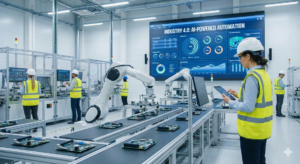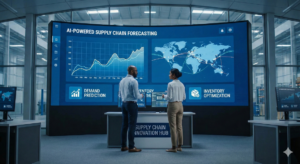The Ways that Artificial Intelligence Is Changing the Management of Human Resources

The Ways that Artificial Intelligence Is Changing the Management of Human Resources
The management of human resources (HRM) has always been concerned with people, whether it is hiring the best possible talent, monitoring employee performance, or encouraging the professional development of employees. On the other hand, experts in human resources are confronted with a number of obstacles that are becoming more and more difficult to overcome in the current corporate climate, which is constantly evolving. Some of these issues include a lack of qualified employees, high rates of employee turnover, remote work, and employees’ desire to have their experiences at work be tailored to them.
Artificial intelligence (AI) is introduced at this point. Artificial intelligence (AI) is not only a term in technology circles anymore; it is quickly transforming human resources (HR) operations, making them more effective, data-driven, and employee-friendly. Organizations are changing the way they attract, manage, and retain personnel due to the impact of artificial intelligence (AI), which is being used in everything from recruiting to employee engagement.
The Use of Artificial Intelligence in the Recruitment and Talent Acquisition Process
Recruiting is one of the most time-consuming parts of human resources management. Artificial intelligence (AI) makes this procedure more efficient by:
- Automated Resume Screening: Artificial intelligence systems have the ability to scan through hundreds of applications and screen individuals based on their abilities, credentials, and experience.
- Chatbots for Candidate Interaction: Artificial intelligence (AI) chatbots interact with candidates, provide answers to frequently asked questions, and arrange interviews, so enhancing the experience for applicants.
- Predictive recruiting Models: These models use machine learning to analyze prior recruiting data and performance results in order to forecast the success of future candidates.
- Reduction of Bias: Properly designed artificial intelligence (AI) technologies assist in minimizing unconscious bias throughout the recruiting process, which in turn results in workforces that are more diverse.
Training and Onboarding of New Employees
By tailoring the onboarding procedure to the unique needs of each employee, artificial intelligence (AI) enhances the process. When new employees are hired, virtual assistants are there to walk them through the company’s regulations, needed documentation, and training modules.
When workers are in training, learning platforms that are driven by artificial intelligence (AI) suggest courses for them to take based on the positions they hold, the skills they possess, and their objectives for their careers. Adaptive learning guarantees that workers get knowledge that is specifically adapted to them, as opposed to a one-size-fits-all method.
Performance management and employee development are two aspects of human resources that are intertwined.
- By evaluating data from project management tools, feedback systems, and productivity measures, artificial intelligence (AI) gives real-time insights into employee performance.
- Continuous Feedback: Artificial intelligence (AI)-powered systems have the capability to continuously monitor performance, as opposed to the traditional method of conducting evaluations once a year.
- Skill Gap Analysis: Artificial intelligence is used to identify areas where workers require further growth and to provide chances for tailored development.
- Career pathing involves the use of predictive analytics in order to identify possible career pathways inside the firm, which helps to improve employee retention.
Employee Engagement and Retention
High staff turnover is expensive. Artificial intelligence (AI) assists human resource (HR) departments in maintaining high levels of employee engagement through:
- Sentiment Analysis: Artificial intelligence (AI) techniques are used to evaluate surveys, feedback, and communication channels in order to determine how satisfied employees are.
- Engagement Plans That Are Personalized: Artificial intelligence (AI) suggests efforts that might raise morale, like as wellness programs or flexible work possibilities.
- Predictive Retention Models: Machine learning algorithms are able to estimate which workers are at danger of leaving, which allows for interventions to be implemented proactively.
Decision Making and Human Resources Analytics
Human resources workers are empowered by artificial intelligence (AI) to make choices that are more informed and driven by data.
- Workforce planning involves making predictions about the number of new employees that will be needed in the future based on the development of the organization and current trends in the industry.
- Optimization of Employee Benefits and remuneration: Examines the information pertaining to employees in order to develop packages that are both equitable and competitive in terms of remuneration.
- Monitoring of Diversity and Inclusion: Keeps an eye on the demographics of the workforce in order to guarantee that the objectives for diversity are achieved.
Advantages of Artificial Intelligence in Human Resource Management
Efficiency: Automating routine processes allows human resources experts to devote their time to strategic work.
- Accuracy: Decreases the amount of mistakes made by people in decision-making and data management.
- Fairness: Reduces prejudice in the processes of hiring and assessment
- Customization: It is a tool that can be used to provide employees with personalized experiences.
- Scalability: able to manage high quantities of HR work as firms develop.
Difficulties Associated with Artificial Intelligence in Human Resource Management
The use of artificial intelligence in human resources presents a number of obstacles, despite the fact that it also offers a number of benefits:
- Prejudice in Algorithms: Artificial intelligence (AI) models that are not properly trained may inadvertently perpetuate prejudice.
- Concerns about Data Privacy: When it comes to employee data, it is essential to handle it in a responsible manner.
- Resistance to Change: There are a number of human resources professionals and workers who could be dubious about judgments that are driven by artificial intelligence.
- Overdependence on Automation: The judgment of human beings continues to be a crucial element in HR procedures.
The Future of Artificial Intelligence (AI) in the Management of Human Resources
There is a high probability that the future of human resources (HR) will include even more profound integration of artificial intelligence (AI), which will include:
- Virtual human resources assistants that are powered by artificial intelligence: addressing questions from employees as they come up.
- Predictive Workforce Trends: Preparing for future changes in the market and ensuring that workforce policies are updated to reflect those changes
- The Well-Being of Employees Tracking: Monitoring workload, stress levels, and general well-being using the use of artificial intelligence
- Integration with the Metaverse: Activities such as virtual onboarding, training, and team-building exercises in immersive settings
- Artificial intelligence will not take the position of human resource experts; it will instead enhance the functions that they do, allowing them to devote more attention to strategy, innovation, and projects that are focused on people.
The administration of human resources is being transformed by artificial intelligence (AI), which is making procedures more effective, accurate, and focused on employees. Artificial intelligence provides human resources managers with the tools they need to get a deeper understanding of their workforce, enhance engagement, and prepare for the future of work, from recruiting to retention.
The advantages of artificial intelligence (AI) in human resources management (HRM) are so considerable that they cannot be overlooked, even while problems like as prejudice and privacy must be dealt with. Organizations that adopt human resources methods that are centered on artificial intelligence will be able to develop teams that are more robust, more content, and more prepared for the future, which will provide them an advantage over their competitors.






